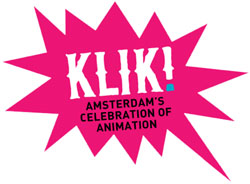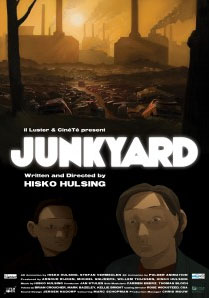
I am interrupting my series on the Tezuka Pro TV Specials of 1978-1989 to bring you a review of “Dutch Delights!”, a program of recent independent, fine-art & experimental shorts culled from the KLIK! Animation Festival, that has just been shown locally by ASIFA-Hollywood. This program is currently touring the West Coast; it will be in San Francisco from May 28 to 30, and in Portland, Oregon from June 1 to 3. If you have an opportunity to see it, I recommend it highly.
 KLIK is a major European animation festival that has organized a West Coast tour to introduce itself to the animation communities on the West Coast. The program will feature many award-winning shorts and will include titles such as Fata Morgana, Canal, Through You, Little Freak, Snapshot, Leaving Home, Junkyard, End Trip, Blik, and Things You Better Not Mix Up. The program includes a Q&A with Dutch animation director Joost Lieuwma and Tünde Vollenbroek, KLIK’s program director.
KLIK is a major European animation festival that has organized a West Coast tour to introduce itself to the animation communities on the West Coast. The program will feature many award-winning shorts and will include titles such as Fata Morgana, Canal, Through You, Little Freak, Snapshot, Leaving Home, Junkyard, End Trip, Blik, and Things You Better Not Mix Up. The program includes a Q&A with Dutch animation director Joost Lieuwma and Tünde Vollenbroek, KLIK’s program director.
The KLIK! Animation Festival, in Amsterdam, began in 2007 according to KLIK!’s history, although the first festival was in 2008. This year’s forthcoming one, on November 4 – 9, 2014, will be the seventh. KLIK! shows short animated films, usually ten minutes or less, from around the world – previous festivals have included Luminaris from Argentina and Rabbit and Deer from Hungary – but all of the films in “Dutch Delights!” were from the Netherlands.
Woodbury University is a small but very modern (despite a sign at its entrance saying that it was established in 1884) liberal-arts university in Burbank, California. (Jerry Beck teaches an Animation History course there). The “Dutch Delights!” program was introduced and shown by ASIFA-Hollywood president Frank Gladstone, with four KLIK! Directors and/or the Dutch filmmakers as speakers.
The 15 short films were:
Fata Morgana. D: Frodo Kuipers, 4’18”.
Canal. Ds: Joost de Jong, Michaël Koning, Nick Groeneveld, Jeroen Hoolmans; 4’25”.
Through You. D: Lucette Braune, 7’55”.
Little Freak. D: Edwin Schaap, 3’33.
Junkyard. D: Hisko Hulsing, 17’50”.
Snapshot. D: Arthur van Merwijk; 2’30”.
Happy Camper. P: JobJorisenMarieke, 3’10”.
Losing Nemo. D: Douwe van der Werf; 6’55”.
Leaving Home. D: Joost Liewma, 6’37”.
Helpiman. D: Aisha Madu; 2’57”.
End Trip. Ds: Koen de Mol, Olivier Ballast, Rick Franssen; 5’10”.
Blik. D: Bastiaan Schravendeel; 2’33”.
Things You’d Better Not Mix Up. D: Joost Liewma; 2’12”.
KLIK! 2012 official leader. Ds: Joost Liewma, Patrick Schoenmaker, Lukas Krepel; 0’58”.
KLIK! Let’s All Go to the Lobby. 0’50”.
The 15 films were a very mixed lot. Like most European short films, they were mostly in pantomime so they can be shown internationally without redubbing. In roughly the descending order in which I liked them, my favorite was Arthur van Merwijk’s humorous cartoon Snapshot. A middle-aged couple go to the forest to get some wildlife photograph, but miss all the animals either through their own incompetence or an increasingly unlikely series of mishaps.
Bastiaan Schravendeel’s Blik is a tender CGI film about a ten- or eleven-year-old boy who gets a puppy-love crush on an older teenage girl, who thinks he’s sweet but is developing her own first romance with a boy her own age. The characters have no faces; Blik is developed solely through body-language.
Joost Liewma’s Leaving Home (Lieuwma was one of the speakers) is about a young man setting out into the world – in fact, his father throws him out, despite his extreme reluctance to “leave the nest”.
Frodo Kuipers’ (I couldn’t help wondering if his parents were Tolkien fans) Fata Morgana features a desert lemonade stand proprietor torn between wanting to sell his last bottle and wanting to drink it himself. It helps to know that a “Fata Morgana” is a mirage.
Aisha Madu’s Helpiman (a student film) is a cynical parable about a man who helps three others, but when he needs help himself, their attitude is, “What have you done for us in the last two minutes?” Let’s All Go to the Lobby does not have a directorial credit; it is a parody by seven students of Hogeschool voor de Kunsten Utrecht (Utrecht School of the Arts; HKU) to the soundtrack of a 50-second 1950s American theatrical advertisement for lobby refreshments.
Happy Camper, about a yeti camping out, is a spritely music video with a producer’s rather than a director’s credit. KLIK!’s 2012 leader is about a fish in Amsterdam’s canals evolving into a giant monster that attacks the KLIK! 2012 festival. Joost Liewma’s Things You’d Better Not Mix Up shows the dangers of mixing up a lion tamer’s lion and a magician’s rabbit – a chain saw and an ice cream cone – a parachute and a toilet – a life preserver and a bear trap – the first couple are funny but even at barely over two minutes, it goes on too long.
Canal (Gratcht), an overdone CGI piece with four directors, is a pantomime piece about two clueless furniture movers, a ditzy girl who hires but does not supervise them, and a thief – but at the end, maybe the movers aren’t as clueless as they look.
Lucette Braune’s Through You is about a young woman who goes shopping and surrealistically passes through the other pedestrians on the streets. Nicely animated, but WTF? End Trip is a psychedelic portrayal of a bad (fatal?) drug overdose.
Losing Nemo, sponsored by an ecological foundation, is a didactic warning about industrial overfishing the seas. Edwin Shaap’s Little Freak is a very well made but extremely depressing CGI piece about the birthday of a sad, deformed child whose father has turned him into a sideshow “monster”.
 And Hisko Hulsing’s Junkyard – winner of a Holland Animation Film Festival’s Grand Prix Dutch Animation, an Ottawa International Animation Festival’s Grand Prize, a Stuttgart Festival of Animated Film audience award, and seventeen other international animation festival awards; plus the official Dutch entry for the Best Animated Short Oscar in 2013 — is about a dying young street punk’s flashback to what led him to his life of crime. His killer may have been his best friend in his youth, but all the characters look too grungy to tell. (You can’t even tell the boys from the girls.) Reviews have described it as “brutal” and “soul-wrenching”. It’s undoubtedly a masterpiece of animation, combining 2D and 3D cartooning and oil painting on canvas, and so well directed that it is hard to tell if any of its almost-18 minutes could be shortened, but it is a Socially Relevant rather than a happy film.
And Hisko Hulsing’s Junkyard – winner of a Holland Animation Film Festival’s Grand Prix Dutch Animation, an Ottawa International Animation Festival’s Grand Prize, a Stuttgart Festival of Animated Film audience award, and seventeen other international animation festival awards; plus the official Dutch entry for the Best Animated Short Oscar in 2013 — is about a dying young street punk’s flashback to what led him to his life of crime. His killer may have been his best friend in his youth, but all the characters look too grungy to tell. (You can’t even tell the boys from the girls.) Reviews have described it as “brutal” and “soul-wrenching”. It’s undoubtedly a masterpiece of animation, combining 2D and 3D cartooning and oil painting on canvas, and so well directed that it is hard to tell if any of its almost-18 minutes could be shortened, but it is a Socially Relevant rather than a happy film.
This review may tell you more about me than about the films. Considering my likes and dislikes, it’s a good thing that “Dutch Delights” mixes them thoroughly. I can’t say that any of them bored me. Any cinematic program with ten or more films is going to be a mixture of likes and dislikes, so “Dutch Delights!” did not surprise or disappoint me. Even the films that I did not enjoy, I mostly respected. (Except for Losing Nemo, which is much too preachy. I blame that on the sponsoring The Black Fish group, which held a posh black tie premiere in Amsterdam for it in May 2013, at which vegan sushi was served.)
KLIK Official promos since 2008


 Fred Patten (1940-2018) was an internationally respected comics and animation historian. He has written about anime or comic books for publications ranging from Animation Magazine and Alter Ego to Starlog. He was a contributor to The Animated Movie Guide (2005), and is author of Watching Anime, Reading Manga (2004, Stone Bridge Press), a collection of his best essays, and Funny Animals and More (2014, Theme Park Press), based upon his early columns here on Cartoon Research. He passed away on November 12th, 2018.
Fred Patten (1940-2018) was an internationally respected comics and animation historian. He has written about anime or comic books for publications ranging from Animation Magazine and Alter Ego to Starlog. He was a contributor to The Animated Movie Guide (2005), and is author of Watching Anime, Reading Manga (2004, Stone Bridge Press), a collection of his best essays, and Funny Animals and More (2014, Theme Park Press), based upon his early columns here on Cartoon Research. He passed away on November 12th, 2018.





































Things You’d Better Not Mix Up is great!
Where was this shown in L.A.? Usually we hear about such showings.
The program Fred is reviewing on was shown at Woodbury University in Burbank last Friday via Asifa Hollywood. Another “best-of-the-fest” program was screened publicly at The The Cinefamily last Thursday. The festival organizers have been screening this program at the studios (Dreamworks, Disney, etc.) this past week and are now going on to northern California and Portland next week.
The screening Fred attended was a special presentation for ASIFA-Hollywood. Members knew about it via our membership e-mail blasts and social media. It was a members and guests only event. ASIFA-Hollywood (http://www.asifa-hollywood.org/) has many such screenings and events throughout the year.
This festival is very poorly organized, unfortunately. I loaned them a print of “Symphony In Slang” free of charge last year and they tried to stiff me for the costs of international shipping! After months of wrangling with FedEx about the charges, FedEx dropped the case, no thanks to the KliK! Festival. So caveat emptor folks!
It may be poorly organized, but it is a well curated event.
As for loaning prints: I’d warn you – and all collectors with rare prints – not to loan any prints for free, to any festival, anywhere (especially internationally). At this point in time, with digital projection, I’d ask the festival to foot the bill to create a HD master from your print. Make two 4K copies – keep one and loan them the other one (and get it back). That’s what I’d do from now on.
Practically all fine-arts screenings like this are seriously underfunded, and try to pinch pennies in every way possible. I was associated with Terry Thoren’s Los Angeles International Animation Festival in the late 1980s, and despite a prestigious name and some notable guests — I remember Feodor Khitruk coming from the Soviet Union with an entourage of at least one animator from each of the 15 countries of the Soviet Union (who knew there were animators in Uzbekistan or Turkmenistan? – though Robert Sakyants from Armenia was impressive) — it was held in one of the smallest and grungiest theaters in West L.A. We had to economize, economize, economize!, and we still ran out of money after four festivals. There was the time that they held a midnight screening when the roof was off the theater for repairs, and it rained …
Would just like to set this straight – we didn’t try to get you to pay the shipping costs, not in any way. We were very grateful for your kindness and wouldn’t do such a thing. We should have handled the problem quicker when you told us about the problem with Fedex, definitely, we also apologize(d) for that. But it was in no way intentionally, I’m very sorry you felt that way (I had no idea you did).
Anyway, what Jerry proposes is a very good idea. We’ll think about that in the future.
Damn Mark, I didn’t get into that hassle when KLIK! asked for my print of Ernest Pintoff’s “The Violinist.” At least I didn’t have to pay a cent since I got it sent to a FedEx store to send it and to pick it up afterwards (though I think it was a month later when I got it again). Not sure if my name was ever mentioned at the event for having supplied said film, but I was assured they did. Kinda hoped my name was at least printed in their booklet they sent me but no.
As for loaning prints: I’d warn you – and all collectors with rare prints – not to loan any prints for free, to any festival, anywhere (especially internationally). At this point in time, with digital projection, I’d ask the festival to foot the bill to create a HD master from your print. Make two 4K copies – keep one and loan them the other one (and get it back). That’s what I’d do from now on.
I should’ve learned that lesson but didn’t, at least my case wasn’t as bad as Mark’s. I would think it would be wise to make a digital copy in this day and age if they can foot the bill indeed. I actually hoped they did that for my print though I didn’t inquire about wanting a video copy of the film as well if they could do that (assuming how this was projected since I wasn’t sure they were doing it all on film or digitally.
Thanks Fred for attending and for your lovely review!
Like most European short films, they were mostly in pantomime so they can be shown internationally without redubbing.
Arguably those are the most effective I’m sure. They wouldn’t have to worry about sticking to one language or another though it is nice when titles or credits are in English too!
Of course when I think of Dutch animation of the past that had used English dialogue somewhat, some of Paul Driessen’s work comes to mind, like this…
https://www.youtube.com/watch?v=FVCxHP_W_rw